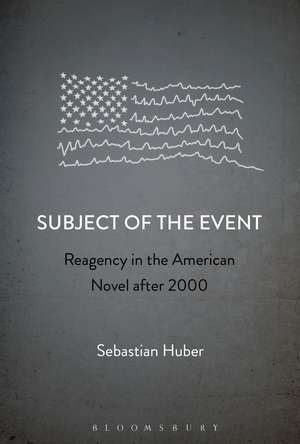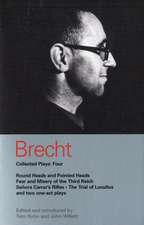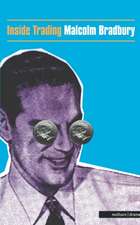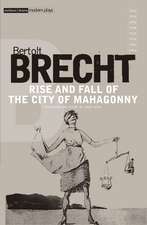Subject of the Event: Reagency in the American Novel after 2000
Autor Dr. Sebastian Huberen Limba Engleză Paperback – 29 noi 2017
| Toate formatele și edițiile | Preț | Express |
|---|---|---|
| Paperback (1) | 239.32 lei 6-8 săpt. | |
| Bloomsbury Publishing – 29 noi 2017 | 239.32 lei 6-8 săpt. | |
| Hardback (1) | 775.35 lei 6-8 săpt. | |
| Bloomsbury Publishing – 4 mai 2016 | 775.35 lei 6-8 săpt. |
Preț: 239.32 lei
Preț vechi: 273.60 lei
-13% Nou
Puncte Express: 359
Preț estimativ în valută:
45.79€ • 47.81$ • 37.90£
45.79€ • 47.81$ • 37.90£
Carte tipărită la comandă
Livrare economică 05-19 aprilie
Preluare comenzi: 021 569.72.76
Specificații
ISBN-13: 9781501338083
ISBN-10: 1501338080
Pagini: 328
Greutate: 0.44 kg
Ediția:NIPPOD
Editura: Bloomsbury Publishing
Colecția Bloomsbury Academic
Locul publicării:New York, United States
ISBN-10: 1501338080
Pagini: 328
Greutate: 0.44 kg
Ediția:NIPPOD
Editura: Bloomsbury Publishing
Colecția Bloomsbury Academic
Locul publicării:New York, United States
Caracteristici
Inspects the importance of events in a diverse range of areas within literary criticism: ecocriticism, trauma studies, African-American studies, ethics, and narratology
Notă biografică
Sebastian Huber is Lecturer for English at the Fresenius University, Munich, Germany.
Cuprins
AcknowledgementsList of AbbreviationsIntroduction: America's Subjects of EventsChapter 1. The Question of the Event and the Question(s) of the SubjectChapter 2. 'You have to carry the fire': The Reactive Subject in Cormac McCarthy's The Road (2006)Chapter 3. 'With Us or Against Us': The Obscure Subject in Jess Walter's The Zero (2006)Chapter 4. 'Let us go then you and I': The Amorous Subject in Mark Z. Danielewski's Only Revolutions (2006)Chapter 5. 'You'll never be passé': The Aesthetico-Political Subject in Paul Beatty's Slumberland (2008)Chapter 6. 'There is nothing to compare it to now': The Scientific-Political Subjects in Thomas Pynchon's Against the Day (2006)Conclusion: The End as EnjambmentNotesBibliographyIndex
Recenzii
Drawing on Alain Badiou's notion of 'the subject of the event,' Huber leads the way out of a conceptual deadlock that has informed much of contemporary literary studies. Having less agency than the premodern 'subject-supposed-to-be-autonomous,' but more agency than the postmodern subject 'supposed-to-be-a-victim-of-discursive-circumstance,' the 'subject of the event' allows to think a precarious, invariably site- and time-specific subjectivity that is not either active or passive, but active and passive simultaneously. In a number of brilliantly provocative readings of contemporary American fiction, Huber asks what it means for this new subject - or should I simply say 'us'? - to be 'faithful' or also 'unfaithful' to the event. What ultimately drives the book's argument is Badiou's equally pressing and acute question of 'how are we to be faithful to changing the world within the world itself?' On this background, Huber's book promises to become itself somewhat of an event.
Philosophically rich and packed with ingenious readings, Sebastian Huber's Subject of the Event: Reagency in the American Novel after 2000 is a fresh and exciting intervention in philosophical literary criticism. Indeed, while we may have been told that 'the era of Theory is over,' rumours of its death remain greatly exaggerated. Focusing on Badiou's notion of the 'event' and its complicated interactions with contemporary American fiction, Huber's book demonstrates that there is still gold to be mined at the intersection of philosophy and literature.
Using Alain Badiou's philosophy, Huber defines events as nonontological, contingent, and singular ruptures. By analyzing Cormac McCarthy's The Road (2006), JessWalter's The Zero (2006), Mark Z. Danielewski's Only Revolutions (2006), Paul Beatty's Slumberland (2008), and Thomas Pynchon's Against the Day (2006), he argues that events and subjects are two phenomena that are "inherently reciprocal." America as a concept is fundamentally associated with emphatic events, according to Huber. His goal is to employ a theoretical approach that opposes poststructuralism and postmodernism, while also avoiding the traditional humanist conception of the subject.
Philosophically rich and packed with ingenious readings, Sebastian Huber's Subject of the Event: Reagency in the American Novel after 2000 is a fresh and exciting intervention in philosophical literary criticism. Indeed, while we may have been told that 'the era of Theory is over,' rumours of its death remain greatly exaggerated. Focusing on Badiou's notion of the 'event' and its complicated interactions with contemporary American fiction, Huber's book demonstrates that there is still gold to be mined at the intersection of philosophy and literature.
Using Alain Badiou's philosophy, Huber defines events as nonontological, contingent, and singular ruptures. By analyzing Cormac McCarthy's The Road (2006), JessWalter's The Zero (2006), Mark Z. Danielewski's Only Revolutions (2006), Paul Beatty's Slumberland (2008), and Thomas Pynchon's Against the Day (2006), he argues that events and subjects are two phenomena that are "inherently reciprocal." America as a concept is fundamentally associated with emphatic events, according to Huber. His goal is to employ a theoretical approach that opposes poststructuralism and postmodernism, while also avoiding the traditional humanist conception of the subject.










